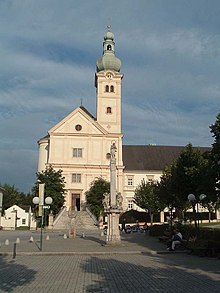Church of St. Nikolaus, Lockenhaus
| Church of St. Nikolaus | |
|---|---|
 |
|
| Basic information | |
| Location | Lockenhaus, Burgenland, Austria |
| Geographic coordinates | 47°24′23.38″N 16°25′9.49″E / 47.4064944°N 16.4193028°ECoordinates: 47°24′23.38″N 16°25′9.49″E / 47.4064944°N 16.4193028°E |
| Affiliation | Roman Catholic |
| District | Diocese of Eisenstadt |
| Province | Archdiocese of Vienna |
| Country | Austria |
| Year consecrated | 1669 |
| Ecclesiastical or organizational status | Parish church |
| Leadership | Monsignore Prof. Pfarrer Josef Herowitsch |
| Website | www |
| Architectural description | |
| Architect(s) | Piero Orsolini |
| Architectural style | early Baroque |
| Groundbreaking | 1655 |
| Completed | 1669 |
The Church of Saints Nicholas (German: Pfarrkirche zum Heiligen Nikolaus, St. Nikolaus) is an early Baroque parish church located in the Güns Valley in Lockenhaus, in the Austrian state of Burgenland. It was built during the period of 1655 to 1669. Commissioned by Franz III. Nádasdy, the church was entrusted to the Augustinians and was dedicated to both St. Nicholas of Myra and St. Nicholas of Tonentino, in reference to the role of Fr. Nicholas Donellan (O.E.S.A) in Nädasdy's conversion to the Catholic faith. The parish church overlooks the town's main square.
Count Nikolaus "Miklós" of Esterházy (1583–1645), palatine of Hungary, made a lot of efforts to win his relative and neighbour Franz III. Nádasdy (1621–1671) over to the Catholic faith. After visiting Italy and meeting with Fr Nicholas Donellan, an Augustinian from Vienna, the 22-year-old Nádasdy publicly declared his conversion to Catholicism on Nov. 25, 1643 in the church of Csepreg, setting in the Catholic restoration in his estates.
Franz III. Nádasdy commissioned the church to Piero Orsolini of Siena, whom Nádasdy met while studying in Italy, oversaw the construction over the course of 13 years. Its construction began in 1655 and the foundation stone was laid on July 2, 1656. Progress delayed when cracks were discovered on the walls. With the building finished, consecration took place in 1669.
The church layout is in the shape of an elongated Greek cross. On the corners, there are chapels with semi-circular indentations. A painting by Georg Kiery of Güns, created in 1675, is located at the high altar; it depicts the church's two Pattron Saints. There are six other altars on the sides of the church. The interior features also include a high relief of cherubs clinging to acanthus leaves.
...
Wikipedia
